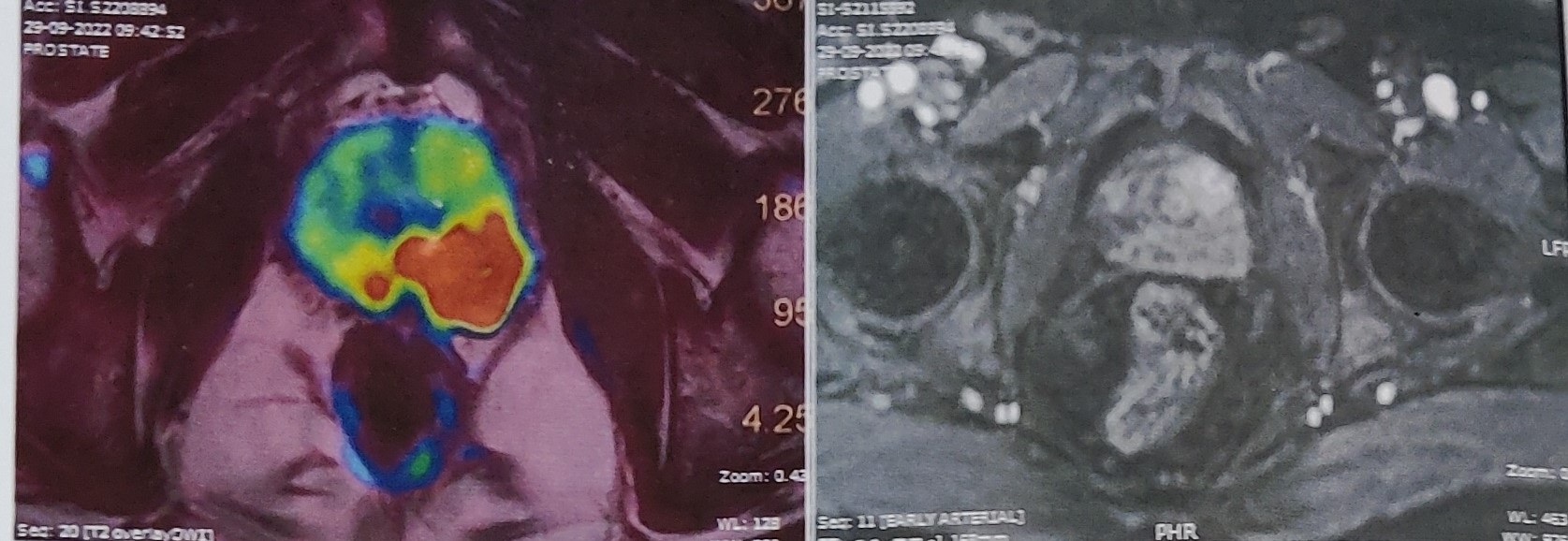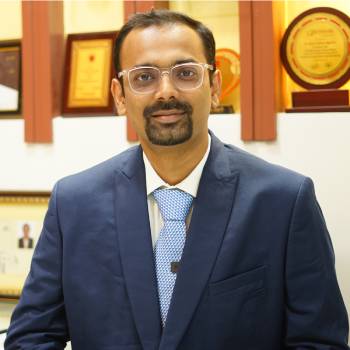Best Doctor for Prostate Cancer Treatment in Vashi, Navi Mumbai
Prostate Cancer : Types, Symptoms, Diagnosis & Treatment

Prostate Cancer MRI
Dr. Varun Agarwal provides a personalized, effective treatment and Robotic Surgery for Prostate Cancer in Vashi, Navi Mumbai.
What is Prostate Cancer ?
Prostate cancer is a condition that primarily affects men and individuals assigned males at birth. It originates in the prostate, a small, walnut-shaped gland positioned just below the bladder and in front of the rectum.
The prostate gland plays a crucial role in producing fluids that combine with semen to support sperm health, which is essential for conception and pregnancy.
Prostate cancer is a significant health concern but is often detected before it spreads beyond the prostate, making it highly treatable at this stage.
Types of Prostate Cancer
The most prevalent form of prostate cancer is adenocarcinoma , which initiates in the cells of glands, including those found in the prostate.
Although less common, prostate cancer can also stem from other cell types, such as small cell carcinomas, neuroendocrine tumors, and sarcomas.
Symptoms and Causes
Prostate cancer typically progresses slowly within the prostate gland.
In its early stages, it may not exhibit any symptoms.
However, as the disease advances, individuals may experience symptoms like
- Increased urgency for urination, especially at night,
- Weakened urine flow,
- Painful urination,
- Urinary and fecal incontinence,
- Erectile dysfunction,
- Blood in semen or urine, and
- Discomfort in the lower back, hip, or chest.
Risk Factors
Several factors can influence the risk of developing prostate cancer:
- Age:
The risk increases with age, with a higher likelihood of diagnosis in those over 50, particularly among individuals aged 65 and older. - Family history:
Having a close family member with prostate cancer can increase your risk two to threefold. - Genetics:
Specific genetic factors, such as Lynch syndrome and the presence of mutated genes like BRCA1 and BRCA2, can elevate your risk.
Additional tests may be required, such as imaging (MRI or transrectal ultrasound) to visualize the prostate gland and identify suspicious areas.
In cases where further confirmation is needed, a biopsy is conducted to examine tissue samples in a lab and determine the presence and aggressiveness of cancer.
Grades and Stages
To assess the cancer's severity and choose the appropriate treatment, healthcare providers employ the Gleason score to measure cancer cell abnormality and staging to determine the extent of cancer's spread.
- Stage 1 : At this stage, the cancer is confined solely to the prostate.
- Stage 2 : The tumor remains localized within the prostate but is more developed compared to Stage 1.
- Stage 3 : Cancer has progressed just beyond the prostate.
- Stage 4 : Cancer might have extended to areas such as the rectum, bones, or other distant parts of the body.
Management and Treatment
The management and treatment of prostate cancer depend on several factors, including the stage, growth rate, and overall health of the individual. Treatment options may involve:
- Surveillance:
Monitoring slow-growing cancer. - Robotic Radical Prostatectomy Surgery:
Removing the prostate gland through various techniques. - Radiation therapy:
argeting the tumor with radiation. - Systemic therapies:
Using medications to combat cancer throughout the body. - Hormonal therapies:
Hormone injections to stop testosterone production - Focal therapy:
Targeting tumors within the prostate.
Each treatment method comes with potential side effects, including incontinence, erectile dysfunction, and infertility. These side effects may be managed with medications or procedures, so it's essential to communicate openly with your healthcare provider.
Prevention
While it's not possible to prevent prostate cancer entirely, you can take steps to reduce your risk, including:
-
Regular prostate screenings based on your risk factors. -
Maintaining a healthy weight. -
Engaging in regular physical activity, as recommended by the CDC. -
Adopting a nutritious diet, focusing on fruits, vegetables, and whole grains while limiting red meats and processed foods. -
Quitting smoking and avoiding tobacco products. If you're a smoker, working with your healthcare provider on a smoking cessation program can help you kick the habit.
By following these guidelines and seeking appropriate medical care, you can enhance your overall health and well-being while reducing your risk of prostate cancer.
Dr. Varun Agarwal, a distinguished uro-oncologist and robotic surgeon based in Vashi, Navi Mumbai, has undoubtedly made a significant impact in the realm of prostate cancer diagnosis and treatment.
His unwavering commitment to patient care, coupled with a profound understanding of the complexities of this disease, has offered countless individuals a glimmer of hope in their battle against prostate cancer.
Dr. Agarwal's expertise in cutting-edge robotic surgical techniques has not only enhanced treatment outcomes but has also redefined the standards of care in this field. His compassionate approach, combined with a reputation for excellence, solidifies his pivotal role as a beacon of optimism for patients and their families, making him a true luminary in the fight against prostate cancer.
Patient Testimonials
Meet our Uro-Oncologist and Robotic Surgeon






